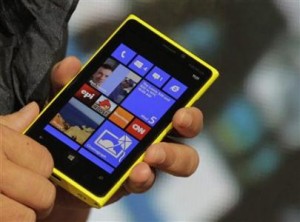 What if Microsoft threw a party and no one attended?
What if Microsoft threw a party and no one attended?
The answer to that question is probably, “who cares?” Because that’s almost exactly what happened Wednesday, when Nokia, Microsoft’s closest strategic Windows Phone partner, held a “big event” unveiling their two new phones that will run Windows Phone 8.
Most of the event was spent describing the hardware features of the yet-to-be-released Lumia 920 and its lesser cousin the 820. Microsoft’s manager of their Windows Phone program was there and gave a presentation on some of the features of the phone, but had relatively few details about the real meat of the new mobile operating system.
Reaction to the “big event” has been pretty much low-key. The phones don’t have a ship date (rumors are November for Europe). The technical press is wondering why Microsoft had so little to say about their soon-to-be flagship operating system – the very operating system on which Microsoft’s future hinges. And the average technology consumer has no clue there was even an event.
Contrast this to Apple’s situation. iOS 6 and its new features were unveiled in great detail back in June. Apple’s September 12th event, which will almost certainly unveil the rumored iPhone 5, is big news not only in tech circles but in the mainstream media as well. Average consumers are well aware of the event and will likely know what was announced by the end of that day.
So why is Microsoft being so shy about offering up more details about Windows Phone 8? We can’t know for sure, but I can speculate. And I can’t think of a feasible scenario that is good for Microsoft. There are three main possibilities.
The first scenario is that Microsoft could be behind schedule getting all the features of Windows Phone 8 implemented. So they can’t show off the features because they can’t get them running reliably enough to demo them. Obviously, that’s bad. If Windows 8 Phone is delayed, it only allows Apple to gain a bigger lead. A shipping delay would also make Microsoft look bad and possibly give Windows 8 a bad reputation. This really puts Microsoft in-between a rock and a hard place, because their alternative would be to rush Windows 8 Phone to market before it is fully ready. By doing this, they take the risk of shipping buggy, unreliable devices which would also put a black-eye on Microsoft’s already shaky reputation and potentially sink their entire marketing strategy for Windows 8.
Second, Microsoft may not want to cut into sales of Windows 7 Phones. Or more correctly, they may not want to alienate their hardware partners who have large inventories of Windows 7 phones gathering dust. Which is really a bad thing for consumers, since any phone that runs Windows 7 will not run Windows 8. Anybody that gets suckered mistakenly buys a Windows 7 phone will be very unhappy when they find out their brand-new phone is already obsolete, which again, only hurts Microsoft’s already weak reputation among consumers.
Third, Microsoft may realize that Windows 8 phone doesn’t really compare favorably to the iPhone or even Android phones. So they are letting their hardware vendors tout their hardware features for the time being. If true, that is a losing proposition as marketing on hardware features isn’t working with consumers. The iPhone sells because of the entire package of hardware, software, and ecosystem. Obviously Windows 8 Phone is nowhere near that yet. So perhaps Microsoft wants to quietly introduce Windows 8 Phone to market while focusing most of the attention on Windows 8 for PCs and Windows 8/Windows RT for tablets. They may hope that Windows 8 will have a halo effect and that if people are impressed enough with the other versions of Windows 8 that they’ll chomp at the bit to go buy a Windows 8 phone. Of course, if Windows 8 on PCs or tablets isn’t all that impressive, then there will be no halo effect and Windows 8 phones will continue to sell at the lackluster rate Windows 7 phones are. Obviously, that’s bad for Microsoft.
Again, it can not be understated that Microsoft’s future hinges on Windows 8. If Windows 8 isn’t a big hit, Microsoft may slowly fade into irrelevance. The fact that they seem to be so shy about marketing the supposedly great features of Windows 8 puts that future into question.